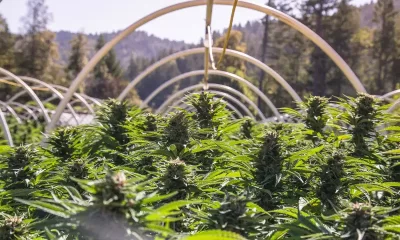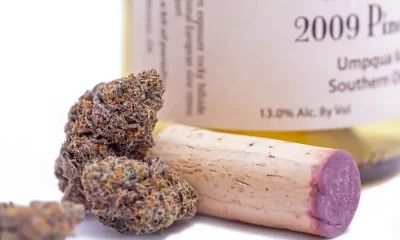Business
Cannabis Industry Seen as a Target for Union Expansion

Union organizers are looking to the cannabis industry as their next frontier for expansion as more and more states fully legalize.
The cannabis industry is seeing a need for unions as more workers are hired and more states legalize. There is an increasing call from workers for better conditions, wages, and benefits, and unions are getting interested.
Cannabis is continually bringing in more money for the U.S. economy. In 2020, the industry brought in a total of between $17.5B and $21.3B and provided between 240,000 and 321,000 full-time jobs. It is projected to reach $41B by 2026. As more states come on with legalization these figures could be even higher.
And already, we are seeing unionization pop up. Modern Cannabis dispensary in Chicago unionized in 2021, and many other businesses in the city have done the same. The first cannabis union contract in Chicago was ratified in March 2022.
“We’re trying to make these careers for the long term, not just one that is a turnover establishment,” says Alex Suarez, who works at Modern Cannabis. “I think the upswing in organization in this country right now is astonishing and we need to keep going over that energy.”
Tonya Townsend, who worked at a Green Thumb Industries cannabis facility in Rock Creek, Illinois when they pioneered unionizing in 2018 and 2019, saw some backlash to the movement. They failed to unionize, as the vote missed by a 26-30 margin.
“There was a lot of union busting. They hired the top union avoidance firm in the country,” she says. “We took them on for about a year. It was a lot. It was mental, physical, verbal, daily abuse from these guys – they fought us tooth and nail the whole way. These workers are reaching out to us for help, so that’s unusual. It used to be we were seeking them out and now they’re coming to us. Our phones are ringing constantly with workers who want protection, higher wages, better benefits and accountability from these companies.”
Unions have also been seeing an uptick in general. Retail has experienced gains in recent years, as 18 of 26 union elections that happened in 2021 are successful. Most of the cannabis unions are from The United Food and Commercial Workers and Teamsters groups, and they are leading even more union campaigns as more legal states and businesses come online.
“There are plenty of people who are having to choose between feeding themselves and putting gas in their car to get to work, which is just kind of mind-boggling, considering it’s a multibillion-dollar industry,” says Maddi, who worked at Ayr Wellness in Massachusetts in 2018, before unionizing. She is now an organizer at UFCW Local 1445 in Massachusetts.
At this time, six states have statutes that require or encourage labor peace agreements for licensed medical or recreational cannabis businesses.
When recreational cannabis was legalized in New Jersey in February 2021, the law included agreements to protect workers’ union organizing efforts. The UFCW represents most of the cannabis workers.
“We were the first organization and labor union to step up to the plate and say this is a valid industry and these workers should not be treated like criminals,” says Hugh Giordano, organizing director of United Food and Commercial Workers Local 360 in New Jersey. “We hope to have 100% union density before the adult use conditional licenses are up and running.”
Beginning in 2021, 500 workers in the cannabis industry have formed unions with the Teamsters.
“When more states legalize recreational cannabis, we can’t let them simply make more minimum-wage jobs available,” says Teamsters general president Sean O’Brien. “We’re demanding careers, backed and safeguarded by Teamster contracts.”
As of today, the industry is literally growing as we speak, and with an uptick in union activity along with this growth means we will see more unions popping up in the future.
Source: https://hightimes.com/news/cannabis-industry-seen-as-a-target-for-union-expansion/
Business
New Mexico cannabis operator fined, loses license for alleged BioTrack fraud

New Mexico regulators fined a cannabis operator nearly $300,000 and revoked its license after the company allegedly created fake reports in the state’s traceability software.
The New Mexico Cannabis Control Division (CCD) accused marijuana manufacturer and retailer Golden Roots of 11 violations, according to Albuquerque Business First.
Golden Roots operates the The Cannabis Revolution Dispensary.
The majority of the violations are related to the Albuquerque company’s improper use of BioTrack, which has been New Mexico’s track-and-trace vendor since 2015.
The CCD alleges Golden Roots reported marijuana production only two months after it had received its vertically integrated license, according to Albuquerque Business First.
Because cannabis takes longer than two months to be cultivated, the CCD was suspicious of the report.
After inspecting the company’s premises, the CCD alleged Golden Roots reported cultivation, transportation and sales in BioTrack but wasn’t able to provide officers who inspected the site evidence that the operator was cultivating cannabis.
In April, the CCD revoked Golden Roots’ license and issued a $10,000 fine, according to the news outlet.
The company requested a hearing, which the regulator scheduled for Sept. 1.
At the hearing, the CCD testified that the company’s dried-cannabis weights in BioTrack were suspicious because they didn’t seem to accurately reflect how much weight marijuana loses as it dries.
Company employees also poorly accounted for why they were making adjustments in the system of up to 24 pounds of cannabis, making comments such as “bad” or “mistake” in the software, Albuquerque Business First reported.
Golden Roots was fined $298,972.05 – the amount regulators allege the company made selling products that weren’t properly accounted for in BioTrack.
The CCD has been cracking down on cannabis operators accused of selling products procured from out-of-state or not grown legally:
- Regulators alleged in August that Albuquerque dispensary Sawmill Sweet Leaf sold out-of-state products and didn’t have a license for extraction.
- Paradise Exotics Distro lost its license in July after regulators alleged the company sold products made in California.
Golden Roots was the first alleged rulebreaker in New Mexico to be asked to pay a large fine.
Source: https://mjbizdaily.com/new-mexico-cannabis-operator-fined-loses-license-for-alleged-biotrack-fraud/
Business
Marijuana companies suing US attorney general in federal prohibition challenge

Four marijuana companies, including a multistate operator, have filed a lawsuit against U.S. Attorney General Merrick Garland in which they allege the federal MJ prohibition under the Controlled Substances Act is no longer constitutional.
According to the complaint, filed Thursday in U.S. District Court in Massachusetts, retailer Canna Provisions, Treevit delivery service CEO Gyasi Sellers, cultivator Wiseacre Farm and MSO Verano Holdings Corp. are all harmed by “the federal government’s unconstitutional ban on cultivating, manufacturing, distributing, or possessing intrastate marijuana.”
Verano is headquartered in Chicago but has operations in Massachusetts; the other three operators are based in Massachusetts.
The lawsuit seeks a ruling that the “Controlled Substances Act is unconstitutional as applied to the intrastate cultivation, manufacture, possession, and distribution of marijuana pursuant to state law.”
The companies want the case to go before the U.S. Supreme Court.
They hired prominent law firm Boies Schiller Flexner to represent them.
The New York-based firm’s principal is David Boies, whose former clients include Microsoft, former presidential candidate Al Gore and Elizabeth Holmes’ disgraced startup Theranos.
Similar challenges to the federal Controlled Substances Act (CSA) have failed.
One such challenge led to a landmark Supreme Court decision in 2005.
In Gonzalez vs. Raich, the highest court in the United States ruled in a 6-3 decision that the commerce clause of the U.S. Constitution gave Congress the power to outlaw marijuana federally, even though state laws allow the cultivation and sale of cannabis.
In the 18 years since that ruling, 23 states and the District of Columbia have legalized adult-use marijuana and the federal government has allowed a multibillion-dollar cannabis industry to thrive.
Since both Congress and the U.S. Department of Justice, currently headed by Garland, have declined to intervene in state-licensed marijuana markets, the key facts that led to the Supreme Court’s 2005 ruling “no longer apply,” Boies said in a statement Thursday.
“The Supreme Court has since made clear that the federal government lacks the authority to regulate purely intrastate commerce,” Boies said.
“Moreover, the facts on which those precedents are based are no longer true.”
Verano President Darren Weiss said in a statement the company is “prepared to bring this case all the way to the Supreme Court in order to align federal law with how Congress has acted for years.”
While the Biden administration’s push to reschedule marijuana would help solve marijuana operators’ federal tax woes, neither rescheduling nor modest Congressional reforms such as the SAFER Banking Act “solve the fundamental issue,” Weiss added.
“The application of the CSA to lawful state-run cannabis business is an unconstitutional overreach on state sovereignty that has led to decades of harm, failed businesses, lost jobs, and unsafe working conditions.”
Business
Alabama to make another attempt Dec. 1 to award medical cannabis licenses

Alabama regulators are targeting Dec. 1 to award the first batch of medical cannabis business licenses after the agency’s first two attempts were scrapped because of scoring errors and litigation.
The first licenses will be awarded to individual cultivators, delivery providers, processors, dispensaries and state testing labs, according to the Alabama Medical Cannabis Commission (AMCC).
Then, on Dec. 12, the AMCC will award licenses for vertically integrated operations, a designation set primarily for multistate operators.
Licenses are expected to be handed out 28 days after they have been awarded, so MMJ production could begin in early January, according to the Alabama Daily News.
That means MMJ products could be available for patients around early March, an AMCC spokesperson told the media outlet.
Regulators initially awarded 21 business licenses in June, only to void them after applicants alleged inconsistencies with how the applications were scored.
Then, in August, the state awarded 24 different licenses – 19 went to June recipients – only to reverse themselves again and scratch those licenses after spurned applicants filed lawsuits.
A state judge dismissed a lawsuit filed by Chicago-based MSO Verano Holdings Corp., but another lawsuit is pending.
Source: https://mjbizdaily.com/alabama-plans-to-award-medical-cannabis-licenses-dec-1/
-

 Business2 years ago
Business2 years agoPot Odor Does Not Justify Probable Cause for Vehicle Searches, Minnesota Court Affirms
-

 Business2 years ago
Business2 years agoNew Mexico cannabis operator fined, loses license for alleged BioTrack fraud
-

 Business2 years ago
Business2 years agoAlabama to make another attempt Dec. 1 to award medical cannabis licenses
-

 Business2 years ago
Business2 years agoWashington State Pays Out $9.4 Million in Refunds Relating to Drug Convictions
-

 Business2 years ago
Business2 years agoMarijuana companies suing US attorney general in federal prohibition challenge
-

 Business2 years ago
Business2 years agoLegal Marijuana Handed A Nothing Burger From NY State
-

 Business2 years ago
Business2 years agoCan Cannabis Help Seasonal Depression
-

 Blogs2 years ago
Blogs2 years agoCannabis Art Is Flourishing On Etsy













